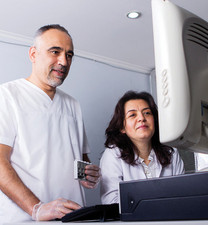No. 11: A system to save the lives of stroke patients

What matters most in stroke treatment … is time.
That’s because tPA, the only FDA-approved drug to treat the so-called “brain attack,” must be administered within a few hours of the onset of stroke. Miss the window, and the path to recovery becomes much rougher.
But the ingenuity of a scientist and physician at Augusta University is buying time and improving the outlook for stroke patients. In the early 2000s, Dr. David Hess and his team at Augusta developed a specialized telemedicine system that allowed neurologists to evaluate and diagnose potential stroke patients from far away.
Dr. Hess knew that one of the major obstacles to fast treatment of stroke patients was a lack of qualified neurologists, especially at small rural hospitals. For their diagnosis, patients had to be transported to larger hospitals by helicopter, losing precious minutes or even hours.
So Hess and the Augusta University team – Grant Kohler, Sam Wang, Bill Hamilton, Hartmut Gross, and Fenwick Nichols – developed the telemedicine system called REACH. While similar systems were being developed around the same time, they relied on a fixed line between two locations. By contrast, REACH's web-based approach enabled qualified neurologists to log on from anywhere.
REACH’s flexible in-room camera allows the neurologist to examine facial movements and assess vision. The software integrates CT images, diagnostic tools, dosage recommendations and decision support, minimizing wasted time. Doctors using REACH can even converse with patients through the system.
The impact of REACH has been phenomenal: hospitals using the system successfully administered tPA at a rate of nearly 35 percent, compared to under 10 percent nationally.
Although acquired by InTouch Health in 2018, the stroke system developed by Hess and his colleagues has expanded well beyond its roots in rural Georgia to serve hundreds of hospitals nationwide. And its use has expanded beyond stroke to treat patients in need of psychiatric evaluations, intensive care, pulmonolgoy and general neurology consultations across multiple settings of care.
